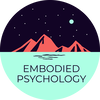I AM
Nicole Perry
Writing about mental health from a feminist counselling perspective
|
Last month I had the pleasure of attending the College of Alberta Psychologist’s Annual General Meeting (AGM), where the topic was "The Psychology of Pain" (and yes, I was actually excited to attend… I’m a typical psychology nerd who loves conferences, workshops, and has a stack of partially read self-help books on my desk). I wanted to share some of the highlights for those of you who live with pain, work with people who live with pain, or both! If you don’t fall into any of these categories, you might still appreciate this information as someone who cares about pain as a feminist issue. Increasingly, psychology is recognizing the social disparities that lead to the development and also treatment of chronic pain. The full Health Canada report also discusses pain disparities in relation to sexual orientation and gender, incarcerated populations, and veterans. It’s important to understand this disparity and what we can do to relieve the burden of the chronic pain that 1 in 4 Canadians over the age of 15 is estimated to be living with. Injustice and our experiences of painThe first speaker at AGM was really interesting because he discussed how feelings of injustice play a role in our experiences of pain. Specifically, he talked about a study where people who had experienced whiplash injury were asked to name the sources of their injustice. What stood out is that they identified clinicians and insurers as the perpetrators of injustice even more so than “the other driver”. This is a big deal. When people come into our office, the last thing we want to do is add to their sense of injury. And yet, sometimes we do. Strategies used in an attempt to reassure our clients (i.e., “the pain won’t always be this bad”) can misfire and actually be experienced as invalidating. Premature focus on the positive is another misstep that can be perceived as dismissing of the client's feelings. People who have experienced difficult or unfair events are often, first and foremost, looking for validation. I love this takeaway because it’s a reminder to all of us as clinicians or helpers: one of the biggest and most powerful things we can do to help with pain is to show up with empathy and align ourselves as an ally. The impact of sleep on pain Another takeaway for me was the reminder about the impact of sleep on pain. As Psychologist Melanie Noel pointed out, they’re now finding that the link between sleep and pain is not as bidirectional as people once assumed. Sleep issues drive the pain. What this means is that addressing sleep can make a huge difference in resolving symptoms of pain. Fortunately, there’s an incredibly effective form of therapy out there called Cognitive Behaviour Therapy for Insomnia (CBT-i). I know that a recommendation for a CBT-based technique from a somatic-relational therapist may be surprising, and yet I really found it helpful for this specific issue. So, if you’re curious, it may be worth checking out. You can do so through a therapist who’s trained it in, or a resource like The Insomnia Workbook by Stephanie Silberman. Treating sexual pain Dr. Lauren Walker also spoke about sexual pain, an issue I too have seen in my practice. The stigma around sexual pain can mean that many people experiencing it don’t receive adequate support, nor even know that help is available. The good news is that there are lots of professionals who can help, including physicians, pelvic floor physiotherapists, and psychologists. Of course, not all professionals are trained in the treatment of sexual pain, so you’ll want to look for someone who is, or get a referral. In Edmonton, Pine Health and Zenith Wellness are just a few of the options for physiotherapy. If you’re looking for other specialized referrals in Edmonton, don't hesitate to ask me. Resources for chronic pain There are so many resources on chronic pain now that you can really find a community of support. A few Instagram accounts specific to migraine that I like include Migraine Canada and Migraine World Summit.
As I’ve mentioned previously, I’ve found the Curable app’s mix of psychoeducation, meditation, and writing exercises to be incredibly helpful. You can also find them on Instagram. At the AGM, they also highlighted the Pain Society of Alberta’s “World Pain Summit” 2021. It’s happening virtually on October 15-17 and it looks amazing. Featured keynote speakers include Dr. Kristen Neff and Dr. Gabor Mate. This event is free to those with lived experience of chronic pain (unless you’re also a healthcare provider). If you’ve ever had your pain discounted, I hope you can start to feel heard and understood.
1 Comment
Liam Strofs
4/27/2024 07:06:28 am
Your blog post was like a breath of fresh air. The unique perspective you provided challenged my thinking and encouraged me to explore new ideas. To delve deeper into this subject, <a href="https://jointeternal.com/discover/#aff=Arpan37873" target="_blank">click here</a>.
Reply
Leave a Reply. |
AuthorNicole Perry is a Registered Psychologist and writer with a private practice in Edmonton. Her approach is collaborative and feminist at its heart. She specializes in healing trauma, building shame resilience, and setting boundaries. About the Blog
This space will provide information, stories, and answers to big questions about some of my favorite topics - boundaries, burnout, trauma, self compassion, and shame resilience - all from a feminist counselling perspective. It's also a space I'm exploring and refining new ideas.
Archives
February 2024
Categories
All
|
Online Portal for Clients
Once we are working together, please use the Owl Practice Client Portal to
|
|
